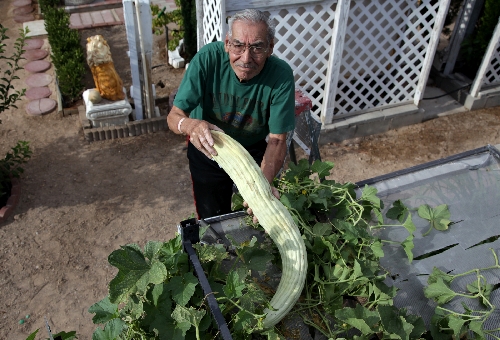Traveling man settles down and grows 3-foot cucumber
When Tony Espinoza called, he made it clear that he wasn't interested in personal fame.
"It's not about me," he said, "It's all about the cucumbers."
Espinoza and his wife, Rose, have lived in their home under the Nellis Air Force Base flight path for 10 years. He's had a backyard garden nearly that long. Every year he tries to plant something new. Four years ago Armenian cucumber seeds caught his eye at Home Depot. They grew well enough the first few years, but this year he was delighted to find that his crop of cucumbers included a pair more than 3 feet long and 14 inches around.
"I didn't do anything special," Espinoza said, "I just put in topsoil and kept watering it."
According to University of Nevada Cooperative Extension Clark County Master Gardener Helen Brown, the natural soil in the valley is too hard and has the wrong sorts of minerals for sustenance gardening, so it's necessary to bring in soil.
"Potting soil is not the greatest, but it's a start, then you amend it," Brown said. "You want to use natural amendments, maybe some bone meal while you plant, and others later. Natural amendments are taken in by the plant and don't wash out of the soil."
In addition to bone meal, Brown also recommends blood meal, cottonseed meal and kelp.
"You don't need all of those; probably one or two will do," she said. "Over time, it nurtures the soil more and more."
In Espinoza's case he dug a long trench in his backyard about 2½ feet deep and filled it with five truckloads of soil.
This was an unusual commitment to property for a man who spent most of his life rootless.
"My father was a crop follower," Espinoza said. "He picked cucumber, tomatoes, that sort of thing, all over the United States. I grew up all over the country."
As soon as he could, Espinoza joined the Air Force, which led to more travel. When he retired 28 years later in 1972, he was offered a civilian job in the Air Force and declined.
"I decided when I retired, I wasn't going to work anymore," Espinoza said. "I was in Tucson when I retired. The next day I was in Mazatlan, Mexico. I was traveling ever since, and when I get tired of traveling, I settle down somewhere. I've lived in Spain, Thailand, Germany I met my wife in the Philippines."
It's not just the cucumbers that are doing well in Espinoza's backyard this year. His peach tree had so many peaches that they were breaking off branches. He has trimmed back his mint three times and still has more than he'll ever need, and he ended up throwing away tomatoes. His pomegranate tree was full of about a bushel of fruit.
"I don't even eat those," Espinoza said.
Brown said growers in Las Vegas need to adjust their planting to the shorter seasons and the valley's diverse soils and growing situations.
"We have something like 189 soil zones in the valley," Brown said. "That last big rain we got, we didn't see any of it where I live (in the foothills of Frenchman Mountain). You don't fail. Every year it's a learning experience and you figure out what's good for your yard."
Brown frequently appears until 1 p.m. at the Cooperative Extension table at the Bet on the Farm! Farmers Market scheduled from 10 a.m. to 3 p.m. Thursdays at the Springs Preserve, 333 S. Valley View Blvd.
She plans to teach a free fall gardening course at 11 a.m. Aug. 18 at the Henderson Whole Foods, 100 S. Green Valley Parkway.
"People are really surprised to find out that the best garden they can have is in the fall," Brown said. "It's amazing. The majority of all our vegetables come out of that season. You don't have to worry about insects or hot weather, so it's the time to flourish."
Brown said it's not unusual for Armenian cucumbers to grow to the size Espinoza's have, but that when they get to that size, they're no longer ideal for eating.
"You want to eat them when they're smaller; that's when they taste best," she said. "When they get really big, they lose their flavor, and they're full of seeds."
Tony and Rose Espinoza have been harvesting and enjoying the smaller Armenian cucumbers, but they are leaving the two largest on the vine.
"I don't need the seeds. I've already got plenty," Espinoza said. "I just want to see how big they'll get."
For more information on the University of Nevada Cooperative Extension's Clark County classes, visit unce.unr.edu or call 257-5555.
For more on the farmers market, visit springspreserve.org or betonthefarm.com or call 822-7700.
Contact Sunrise/Whitney View reporter F. Andrew Taylor at ataylor@viewnews.com or 380-4532.

















